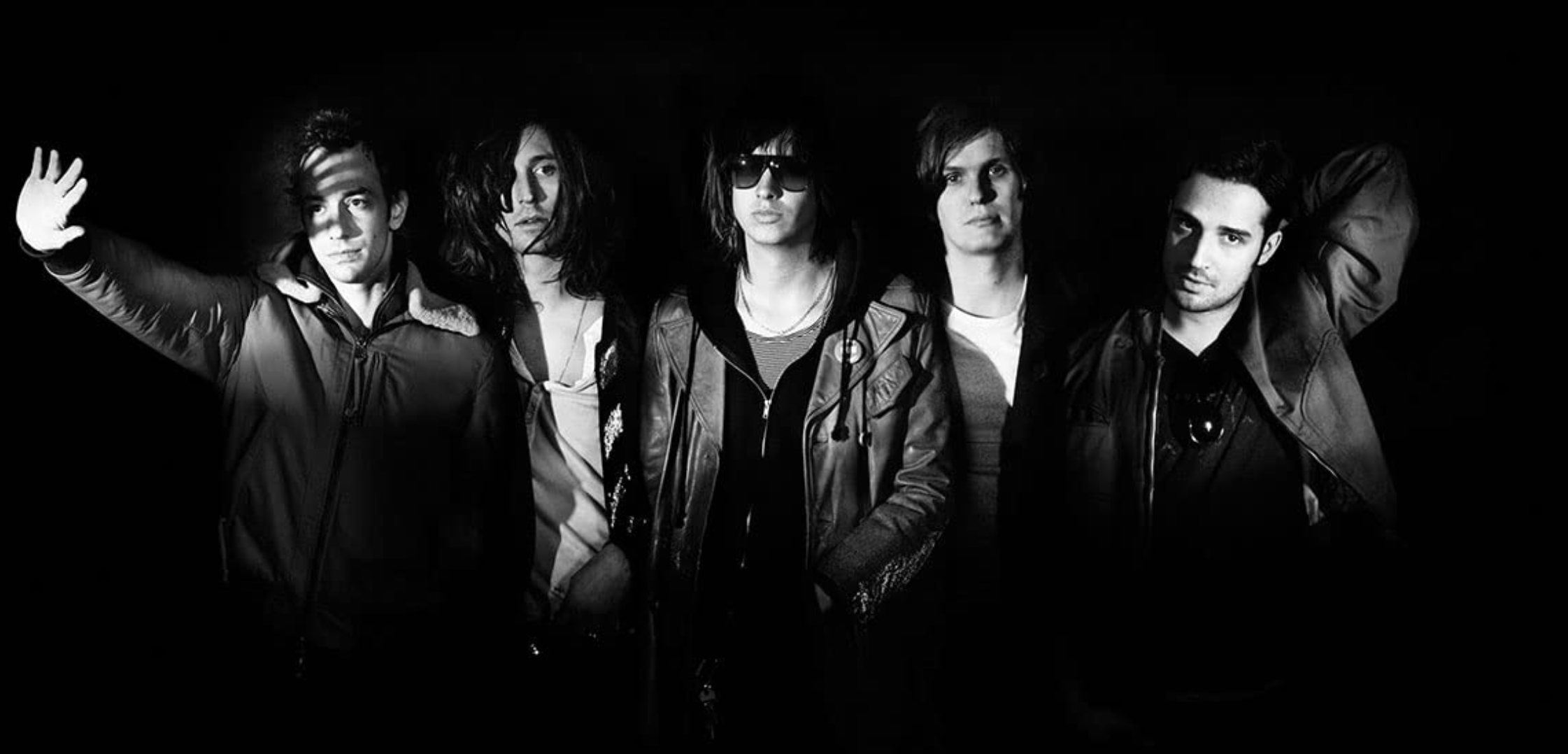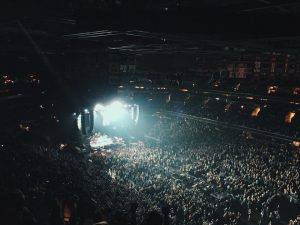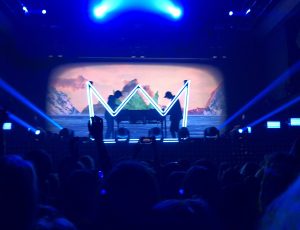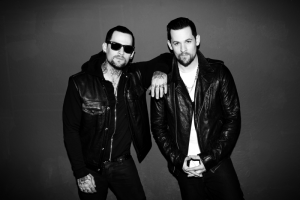They say don’t meet your heroes, but I’m bad at following directions. So when The Strokes announced that they were going on tour last year, I jumped at the opportunity and purchased a ticket eleven months in advance to see them at Nationals Park. Nevermind that none of my friends wanted to go with me, or the fact that The Strokes were simply the opener for the Red Hot Chili Peppers (a band that I, admittedly, was not very familiar with). I was on a mission to experience The Strokes in all of their manifest, authentic glory at least once in my life, and nothing could stand in my way.
The months inched by, the concert simmering in the back burner of my mind on low heat. I slowly made my preparations. On top of my daily The Strokes listening, I did my due diligence by perusing the Red Hot Chili Peppers’ discography.
For those of you unfamiliar with The Strokes, allow me to (wo)mansplain. A leading group of the early 2000s indie rock scene, the New York band is composed of singer Julian Casablancas, guitarists Nick Valensi and Albert Hammond Jr., bassist Nikolai Fraiture, and drummer Fabrizio Moretti. You might know them from their wildly successful debut album Is This It (2001), or more recently, their TikTok famous song “The Adults Are Talking.” Casablancas’ crooning vocals, the blaring guitars and drums, the gritty and greasy New York post-punk feel…all of these factors contribute to the band’s effortlessly cool aura, creating what is—in my opinion—a sonically gratifying experience.
I will not attempt to womansplain the Red Hot Chili Peppers, as my grasp on the band is tenuous at best, and I do not wish to tread on the toes of dedicated fans. I will say, though, that I do casually enjoy their music. I will also say that I think the bands are similar in belonging under the general umbrella of alternative early 2000s rock, perhaps entering dad rock territory, as I imagine the frat bros who once partied to their music decades ago enter middle age.
The fateful day of September 8th finally arrived, and I spent the hours and minutes leading up to the concert excitedly anticipating treating my ears to auditory cocaine. Entering the stadium, I feasted my eyes on the sea of Red Hot Chili Peppers and The Strokes merchandise. I saw a whole family decked out in matching band apparel, with a small boy draped in a Red Hot Chili Peppers shirt like a Roman emperor in an oversized toga. Fighting through the throngs of people streaming up and down the stairs, I made my way to my seat in the field and wedged myself between someone who looked like a Woodstock reenactor and a mostly unassuming man sporting a loud Hawaiian shirt.
Woodstock Reenactor adjusted his bandana and round sunglasses and introduced himself as Jake. He was twenty seven years old and from Morgantown, West Virginia. He was an avid Strokes and Red Hot Chili Peppers fan when he wasn’t trading securities at his day job, having driven three hours to come to this concert. Hawaiian Shirt Guy introduced himself to me and Jake between sips of his beer. His name was Brandon, he was thirty five, and a nuclear engineer. Brandon had already seen the same performance in Philadelphia the previous week but had not gotten enough and was back for round two.
The Strokes appeared on stage as the muggy, mosquito-infested afternoon descended into evening. Immediately I felt juvenile delinquency and youth rebellion coloring the air, despite the fact that the band members are well into their forties. Casablancas strolled on stage with a crooked baseball hat perched on his head, reminiscent of a reluctant child who has been told by their mother to showcase their musical talents to relatives. The crowd (and me) screamed loudly at the band’s entrance. “It’s nice to be with you guys in the evening sun” Casablancas drawled, and the crowd screamed once again at the song reference. “We aren’t performing that today, though,” he said jokingly as he sang a few lines from the song. Classic Julian; what a tease.
Despite the disappointment in not performing “Evening Sun,” The Strokes did deliver with a string of their all time classics, most notably “Meet Me in the Bathroom,” “Hard to Explain,” “You Only Live Once,” and “Reptilia.” They shied away from their newer albums in favor of well-known hits from their first two albums that propelled them to fame, Is This It and Room on Fire (2003). Less experimental than The Strokes’ later work, songs from their debut and sophomore albums are well-known indie rock staples with pretty widespread appeal, which could probably bridge the gap for any less well-versed Red Hot Chili Peppers fans.
The best way to describe The Strokes’ performance style is minimalist. They get on stage, deliver their lines, and avoid any overly performative or charismatic fluff. The band members are not dressed up in fancy outfits but rather a hodgepodge of ripped denim, leather jackets, wrinkly t-shirts, and the occasional oversized blazer. They seem to actively avoid trying too hard to hype the crowd up, preferring to let the blaring guitars and music do all of the talking for them instead. Casablancas performs in a very distinct manner which could be described as almost mumbling the lyrics into the microphone. Some people might find this strategy boring or unpalatable, but the raw and uncut feeling of The Strokes’ performance suits the nonchalant, bad boy vibe of the band very well. The Strokes specialize in encapsulating a lighthearted, almost lazy demeanor that fits into their New York Lower East Side origins in dimly lit local dive bars and dingy venues.
The Strokes closed off their setlist with the classic “Reptilia,” a thrilling and high-energy ending. The stadium was filled with cloudy air (from the smoke machine or the copious amounts of marijuana, I am not sure) and bright flashes of neon green light. Valensi’s mastery of the complicated guitar solo was an absolute delight to witness in person, and Casablancas’ rich vocals were intermittently drowned out by me and neighbors shouting the lyrics in an enthusiastically off-key manner. “I said, please don’t slow me down if I’m going too fast / You’re in a strange part of our town,” Casablancas crooned, and the lyric felt particularly fitting for the situation.
Standing on the floor, the loud drums pounding in my veins, I felt oddly connected to the sea of strangers surrounding me. I imagined that we were one large consolidated mass tied together by the pulsating lights and beats of the music. The sounds and sights were moving almost too quickly for me to process, but the speed was exhilarating. Casablancas is right—please don’t slow me down!
After “Reptilia,” The Strokes filtered off stage. Brandon cracked open what appeared to be his third beer of the night, by the looks of the aluminum collection building underneath his folding chair. “I’m mostly here for the Red Hot Chili Peppers,” he admitted to me as he took a puff of his vape, “but that was sick.”
The rest of the night slipped by in a high-energy blur as the Red Hot Chili Peppers took the stage. I sang along enthusiastically to the songs I recognized (“Californication” and “Otherside”) and bobbed along to the ones I did not. Occasionally, I leaned over to my neighbors and asked for a song title that was dancing on the tip of my tongue and narrowly eluding recall. “Dani California,” Brandon shouted back in response.
As the concert ended and I bid farewell to my newfound friends, I felt a sense of satisfaction and contentment. I had heard The Strokes’ discography tens if not hundreds of times, but experiencing the immersive concert environment, seeing and participating in the screaming crowds, and allowing myself to become swept up in the general frenzy of the night was cathartic and euphoric. The people I saw and met are a testament to the unifying power of music. Dad music, post punk, indie rock—at the end of the day, the labels fall away to reveal a unifying and category-transcending experience.






